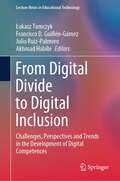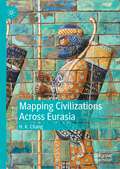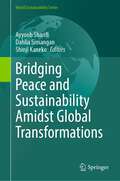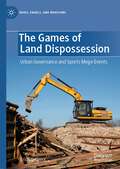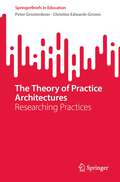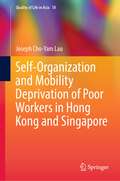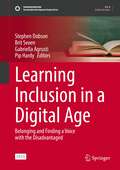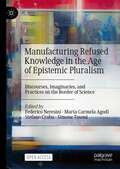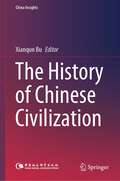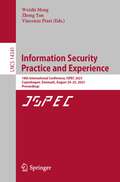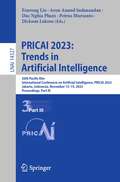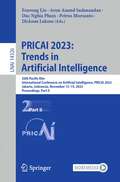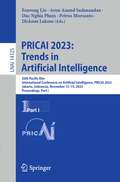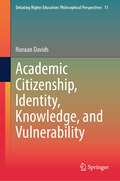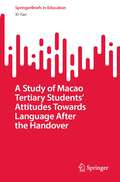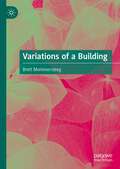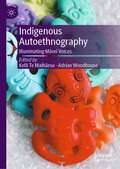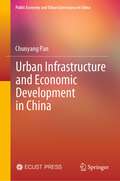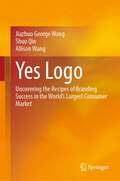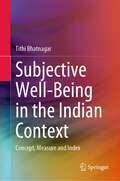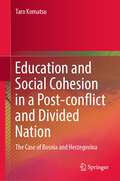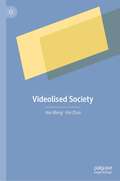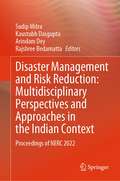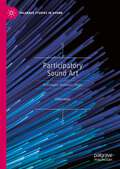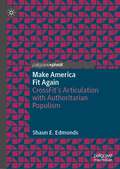- Table View
- List View
From Digital Divide to Digital Inclusion: Challenges, Perspectives and Trends in the Development of Digital Competences (Lecture Notes in Educational Technology)
by Łukasz Tomczyk Francisco D. Guillén-Gámez Julio Ruiz-Palmero Akhmad HabibiThis book offers an expert perspective on two key phenomena in the development of the information society, namely digital inclusion and digital exclusion. Despite the intensive digitalization of various areas in human activity, the lack of proper information and communications technology (ICT) literacy, the lack of access to high-speed Internet, and the still unsatisfactory level of e-services are a reality in many regions and countries. This edited book presents a unique overview of research related to the dynamics of digital exclusion and the development of digital competences, as well as an analysis of the most effective educational solutions to foster the digital inclusion of disadvantaged groups. This book is particularly useful for educators dealing with the topic of digital exclusion and inclusion and who are looking for knowledge on enhancing digital competences in disadvantaged groups. It is also helpful for social policy makers involved in designing solutions to minimize various forms of digital exclusion. Finally, this book serves as a reference for academics and students from the disciplines of pedagogy, social policy, new media psychology, media sociology, and cultural anthropology.
Mapping Civilizations Across Eurasia
by H. K. ChangThis book is a history reader and cultural primer for students and aspiring scholars of past and contemporary interactions among civilizations over the Eurasian landmass. Tracing a human journey that spans several million years, this general survey of civilizations comprises seven sections: Studies on Civilization, Silk Road, Survey of Greater Central Asia, Portrait of India, Persian Cultural Sphere, Caucasus, and Turkish March. The first section introduces methodologies and perspectives for civilization studies. The second focuses on the concept and connotations of the ancient Silk Road as well as China's 21st-century strategic Belt & Road Initiative. In the remaining five sections, the trilingual, peripatetic author, based on his experiences and reflections, provides introductions to and comments on the history, literature, art, social tensions, and future development of five key areas along the Silk Road, i.e., Central Asia, India, Iran, Caucasus, and Turkey.
Bridging Peace and Sustainability Amidst Global Transformations (World Sustainability Series)
by Ayyoob Sharifi Dahlia Simangan Shinji KanekoThis book is the sequel to a well-received book titled ‘Integrated Approaches to Peace and Sustainability’ that aims to further advance the understanding of the dynamic interactions between various components of peace and sustainability. How are peace and sustainability linked to each other, and what are the key parameters that define the nexus between them? This book addresses those questions through a combination of theoretical studies and empirical research that contextualize peace and sustainability issues amid global transformations. The conceptual and empirical linkages between peace and sustainability are widely recognized in academic and policy circles. The adoption of the 2030 Agenda for Sustainable Development confirms this recognition. However, many of the initiatives on peace and sustainability operate in silos, undermining the positive and mutually reinforcing relationship between them. Enhanced integration of peace and sustainability components is imperative for addressing complex challenges that come with global transformations that are manifested environmentally, socially, politically, and economically across levels. It is, therefore, crucial to identify the pathways that enhance the peace-promoting potential of sustainability and the sustainability-promoting potential of peace. The contributions in this edited book elaborate on such pathways by offering insights related to different social, economic, and environmental aspects of the peace-sustainability nexus. Given its inter- and trans-disciplinary focus, the book is of interest to policymakers and researchers working in different areas of peace and sustainability. It contributes to ongoing academic and policy discussions surrounding the outcomes of and challenges to achieving the Sustainable Development Goals (SDGs), particularly SDG 16 on peace, justice and strong institutions.
The Games of Land Dispossession: Urban Governance and Sports Mega-Events (Marx, Engels, and Marxisms)
by Erick OmenaThis book offers a comparative study of state strategies in relation to urban redevelopment projects associated with sports mega-events in Brazil, South Africa and the United Kingdom. It examines urban governance strategies employed to dispossess working-class communities of their land and counteract the subsequent emergence of discontent in various national contexts, offering an intricate analysis of the mechanisms of class dominance operating across diverse regions of the globe. This is based on the application of Gramscian theory concerning the capitalist state and its fluid interplay between coercion and consent. Juxtaposing historical trajectories in the execution of redevelopment initiatives linked to large-scale sporting events, the book offers an in-depth examination of the state-civil society relations shaping the London 2012 and Rio 2016 Olympic Parks, alongside the regeneration initiatives concerning the Maracanã stadium in Rio de Janeiro and the Ellis Park stadium in Johannesburg – respectively earmarked for the 2014 and 2010 FIFA World Cups. Drawing on insights from a range of disciplines and an explicitly Gramscian analytical framework, this book will appeal to students and scholars in urban planning, sport sociology, development studies, and human geography.
The Theory of Practice Architectures: Researching Practices (SpringerBriefs in Education)
by Peter Grootenboer Christine Edwards-GrovesThis book provides an overview of the Theory of Practice Architectures (TPA), and the associated Theory of Ecology of Practices, in a manner accessible for a broader audience. The authors are part of the authorial team that developed the Theory of Practice Architectures from a strong empirical base, with its initial publication in 'Changing Practices, Changing Education' (Kemmis et al., Springer, 2014). This book follows on from that publication with a singluar focus on the Theory of Practice Architectures, and shows how it can be used as a theoretical framework for a range of empirical research projects. It first outlines and describes both the Theory of Practice Architectures and the Theory of Ecology of Practices, illustrating them with a range of relevant practical examples. Then, it focuses explicitly on designing and undertaking empirical research, analyzing data and reporting findings using the Theory of Practice Architectures. In this way, this book shows specifically and overtly explicate ways that research can be designed, and how data can be collected and analyzed, drawing on the Theory of Practice Architectures as a foundational framework. It also showcases a range of specific examples to allow readers to see the ideas as they have been employed in practice.
Self-Organization and Mobility Deprivation of Poor Workers in Hong Kong and Singapore (Quality of Life in Asia #18)
by Joseph Cho-Yam LauThis book focuses on the influence of socio-economic and land-use policies on the commuting problems and quality of life of the poor in Singapore and Hong Kong. It considers the influence of self-organisation: how the mobility of an individual is constituted by structures such as transport systems or socio-economic structural factors, as well as influenced by individual decisions. Where most transport studies focus on the influence of factors such as income inequality, the gender gap, and the built environment, this book fills a gap in paying particular attention to the influence of individual decisions on commuting. Given the prevalence of the former in research, government decision-makers are often constrained by these approaches and fail to understand the commuting problems of the poor. This book argues that the self-organisation approach provides some ideas that are outside the common conceptual framework in conventional transport planning and looks to improve mobility of lower-income commuters. Relevant to social science researchers working in areas such as urban planning and transport, mobility deprivation, and poverty, this book breaks new ground in quality of life studies in the Singapore and Hong Kong contexts.
Learning Inclusion in a Digital Age: Belonging and Finding a Voice with the Disadvantaged (Sustainable Development Goals Series)
by Stephen Dobson Brit Svoen Gabriella Agrusti Pip HardyThis open access book considers how inclusive learning, wellbeing and active citizenship can be encouraged, taught, learnt, and supported in a digital world. The book poses and seeks to address three questions: How can governments and intergovernmental organisations support learning inclusion and active citizenship? How can the education sector and public/private enterprises support learning inclusion and active citizenship? How can professionals and communities work with vulnerable adults who are disadvantaged in a participatory, empowering manner? The Examples discussed in the book draw on the experiences of adult refugees and migrants, as well as people who may experience disadvantage and/or discrimination as a result of their social, economic, political, cultural, religious, physical, mental, age or gender-related status. One methodological pillar in this work is the development of skills in digital storytelling and digital stories creation for personal, community and professional purposes. Conceptually and of interest for researcher and policy makers at local, national and transnational levels, this book brings together a number of related concepts to generate innovative understanding and practices of applied relevance in the age of the pandemic and its aftermath.
Manufacturing Refused Knowledge in the Age of Epistemic Pluralism: Discourses, Imaginaries, and Practices on the Border of Science
by Federico Neresini Maria Carmela Agodi Stefano Crabu Simone TosoniThis open access book explores contemporary practices that challenge science, arguing that this matter cannot be simply disregarded as a new manifestation of “anti-scientism”. It scrutinizes the processes through which knowledge claims, refused by established institutions and the scientific community, seek legitimacy. Assuming an agnostic analytical stance, it explores the actors involved in such processes and their social worlds, their interactions with epistemic institutions, and the ways in which they enact such refused knowledge in their daily lives. Drawing on a three-year mixed-method research project, this collection demonstrates how refused knowledge can be seen as a distinct mode of knowing, employed in response to the uncertainties of everyday life. Thus, it offers a deeper understanding not only of how refused knowledge garners credibility, but also of how knowledge at large – including scientific knowledge – emerges from specific sociotechnical assemblages.
The History of Chinese Civilization (China Insights)
by Xianqun BuThis book tracks the entire history of Chinese civilization from a broad historical view. Its narrative spans a long period between primitive society and contemporary civilization, which makes it a unique academic works.From an academic point of view, this book is accurate in history and combines historical theories. Although brief, it captures the main thrust of the development of Chinese civilization and achieves a broad outline. Important figures, historical events, and achievements of civilization in all times are involved and discussed.From a theoretical point of view, based on the characteristics of early Chinese civilization, the book discusses the connotation of key concepts such as "civilization" and "Chinese civilization", which have certain theoretical value.From a contemporary and practical perspective, the book helps readers understand the history of Chinese civilization and promotes cultural exchanges between China and the world and leads to a better understanding of today’s China.
Information Security Practice and Experience: 18th International Conference, ISPEC 2023, Copenhagen, Denmark, August 24–25, 2023, Proceedings (Lecture Notes in Computer Science #14341)
by Weizhi Meng Zheng Yan Vincenzo PiuriThis book constitutes the refereed proceedings of the 18th International Conference on Information Security Practice and Experience, ISPEC 2023, held in Copenhagen, Denmark, in August 2023.The 27 full papers and 8 short papers included in this volume were carefully reviewed and selected from 80 submissions. The main goal of the conference is to promote research on new information security technologies, including their applications and their integration with IT systems in various vertical sectors.
PRICAI 2023: 20th Pacific Rim International Conference on Artificial Intelligence, PRICAI 2023, Jakarta, Indonesia, November 15–19, 2023, Proceedings, Part III (Lecture Notes in Computer Science #14327)
by Fenrong Liu Arun Anand Sadanandan Duc Nghia Pham Petrus Mursanto Dickson LukoseThis three-volume set, LNCS 14325-14327 constitutes the thoroughly refereed proceedings of the 20th Pacific Rim Conference on Artificial Intelligence, PRICAI 2023, held in Jakarta, Indonesia, in November 2023.The 95 full papers and 36 short papers presented in these volumes were carefully reviewed and selected from 422 submissions. PRICAI covers a wide range of topics in the areas of social and economic importance for countries in the Pacific Rim: artificial intelligence, machine learning, natural language processing, knowledge representation and reasoning, planning and scheduling, computer vision, distributed artificial intelligence, search methodologies, etc.
PRICAI 2023: 20th Pacific Rim International Conference on Artificial Intelligence, PRICAI 2023, Jakarta, Indonesia, November 15–19, 2023, Proceedings, Part II (Lecture Notes in Computer Science #14326)
by Fenrong Liu Arun Anand Sadanandan Duc Nghia Pham Petrus Mursanto Dickson LukoseThis three-volume set, LNCS 14325-14327 constitutes the thoroughly refereed proceedings of the 20th Pacific Rim Conference on Artificial Intelligence, PRICAI 2023, held in Jakarta, Indonesia, in November 2023.The 95 full papers and 36 short papers presented in these volumes were carefully reviewed and selected from 422 submissions. PRICAI covers a wide range of topics in the areas of social and economic importance for countries in the Pacific Rim: artificial intelligence, machine learning, natural language processing, knowledge representation and reasoning, planning and scheduling, computer vision, distributed artificial intelligence, search methodologies, etc.
PRICAI 2023: 20th Pacific Rim International Conference on Artificial Intelligence, PRICAI 2023, Jakarta, Indonesia, November 15–19, 2023, Proceedings, Part I (Lecture Notes in Computer Science #14325)
by Fenrong Liu Arun Anand Sadanandan Duc Nghia Pham Petrus Mursanto Dickson LukoseThis three-volume set, LNCS 14325-14327 constitutes the thoroughly refereed proceedings of the 20th Pacific Rim Conference on Artificial Intelligence, PRICAI 2023, held in Jakarta, Indonesia, in November 2023.The 95 full papers and 36 short papers presented in these volumes were carefully reviewed and selected from 422 submissions. PRICAI covers a wide range of topics in the areas of social and economic importance for countries in the Pacific Rim: artificial intelligence, machine learning, natural language processing, knowledge representation and reasoning, planning and scheduling, computer vision, distributed artificial intelligence, search methodologies, etc.
Academic Citizenship, Identity, Knowledge, and Vulnerability (Debating Higher Education: Philosophical Perspectives #11)
by Nuraan DavidsThis book brings into contestation the idea of academic citizenship as a homogenous and inclusive space. It delves into who academics are and how they come to embody their academic citizenship, if at all. Even when academics hold similar professional standings, their citizenship and implied notions of participation, inclusion, recognition, and belonging are largely pre-determined by their personal identity markers, rather than what they do professionally. As such, it is hard to ignore not only the contested and vulnerable terrain of academic citizenship, but the necessity of unpacking the agonistic space of the university which both sustains and benefits from these contestations and vulnerabilities.The book is influenced by a postcolonial vantage point, interested in unblocking and opening spaces, thoughts, and voices not only of reimagined embodiments and expressions of academic citizenship but of hitherto silenced and discounted forms of knowledge and being. It draws on academics' stories at various universities located in South Africa, USA, UK, Hong Kong, and the Philippines. It steps into the unexplored constructions of how knowledge is used in the deployment of valuing some forms of academic citizenship, while devaluing others. The book argues that different kinds of knowledge are necessary for both the building and questioning of theory: the more expansive our immersion into knowledge, the greater the capacities and opportunities for unlearning and relearning.
A Study of Macao Tertiary Students’ Attitudes Towards Language After the Handover (SpringerBriefs in Education)
by Xi YanThis book focuses on the attitudes of Macao tertiary students toward language after the handover. It shares the findings of a questionnaire survey and semi-structured interviews, which were conducted among freshmen of the University of Macao to investigate their attitudes toward Cantonese, Putonghua, English, and Portuguese, as well as their attitudes toward Macao's language planning and language policy. Utilizing a multidimensional and multilayered perspective in the study, this book also demonstrates the orientations of Macao tertiary students and the correlation between their social categories (gender and social class) and their attitudes toward language.
Variations of a Building
by Brett MommersteegVariations of a Building tells the story of the making of a building. Based on a multi-sited ethnography of the building project for Aviva Studios (formerly, Factory) in Manchester, U.K., a theatre/cultural space designed by the architectural firm OMA, it explores the challenges of sharing in the act of creation by following the everyday practices of designers. Beyond the world of the architects, this book foregrounds a variety of other practices and realities at stake in the building, and offers a rare account of a building project from the point of view of the broader design and project team. More than the making of a building, it argues that it is also an experiment with, and reshaping of, a common world, showing what design practices and building projects can teach us about sharing in acts of creation and knowing. This book will be of interest to researchers and students of architecture, design, urban studies, Actor-Network Theory and Science and Technology Studies.
Indigenous Autoethnography: Illuminating Māori Voices
by Kelli Te Maihāroa Adrian WoodhouseThis book opens new pathways for decolonial autoethnography, presented as a series of reflective stories that showcase how Māori have negotiated and navigated their personal and professional identities within contemporary society. Framed within the academic methodology of Indigenous Autoethnography, authors recount their personal and professional experiences to address their encounters with cultural trauma and personal enlightenment. As a culturally responsive methodology, Indigenous Autoethnography embraces reflective practice and critical awakening to validate Indigenous knowledge, ensuring that it remains meaningful and responsive to the needs of Māori. Utilising metaphorical storytelling as a primary means of sensemaking, this work reinforces the importance of Māori and other Indigenous People to seek wisdom from the past to guide them into the future. With Indigenous knowledge historically ignored and misrepresented in higher education, this seminal text provides invaluable guidance for global Indigenous researchers seeking to produce story work that genuinely encompasses physical, emotional, and spiritual dimensions.
Urban Infrastructure and Economic Development in China (Public Economy and Urban Governance in China)
by Chunyang PanThis book provides an overview of the history, basic concepts, and provision models of infrastructure, significant theories on infrastructure economics, practices at home and abroad that reflect the economic development effects of infrastructure, and four infrastructure economic growth models. Great attention is placed on the domestic front. This book describes and discusses in detail the historical background, development trends, achievements, and challenges of China’s infrastructure from 1949 to 2019, under the classic “supply and demand” analysis framework. From the four perspectives of market integration, open development, people’s livelihood, and endogenous growth, this book carries out an empirical study on how to quantify and make causal inferences about the economic development effects of infrastructure. Based on the conclusion that national governance is of important help to infrastructure provision, this book interprets China’s governance system and its impact on infrastructure provision from the angle of decentralization and offers suggestions on policy optimizing.
Yes Logo: Uncovering the Recipes of Branding Success in the World’s Largest Consumer Market
by Jiazhuo George Wang Shuo Qin Allison WangThis book focuses on how to succeed in China, the globe’s largest consumer market, through the branding market strategy. What are the undisclosed recipes that brands can follow to capture the attention and emotion of consumers in China? What’s the magical key to open the locked doors? The answer to these questions would be intriguing for many readers outside China, including but not limited to executives of global brands, owners of medium-and-small-sized businesses aiming for the global market, branding/marketing professionals, financial investors and analysts, business professors and researchers in universities and colleges, graduate and undergraduate students, and readers with an interest on these topics in the general public.In comparison with many case studies that focus on only a single or few cases, or else lean toward being a macro-discussions of China’s consumer market without in-depth analysis of representative cases, this book provides both. Many branding strategies, programs, and activities presented in this book are of the innovative type, which could be very fresh and interesting to readers. Many of the in-depth analyses and specific insights presented in this book are provided by well-recognized business analysts/writers, which may not be available in other publications. Overall, this book provides readers with the opportunity to receive some valuable new knowledge about how to succeed in the globe’s largest consumer market, providing foodstuff for both thought and enjoyment.
Subjective Well-Being in the Indian Context: Concept, Measure and Index
by Tithi BhatnagarThis book offers an understanding of subjective well-being (SWB) in the Indian context across ages and strata. It discusses the conceptualization and measurement of both subjective well-being (SWB) and subjective ill-being (SIB) through a multi-phased research study. The structure of SWB and development, standardization, and indexing of an SWB Measure provide insights on how the SWB Measure can enable nations to find out the national level of SWB/SIB for its citizens. The index may be useful in identifying the level of people’s well-being or ill-being. It explores the possibility of implications and interventions in optimizing SWB both at the individual and collective levels. It is a consolidated account of the work done in SWB research, particularly with a cultural focus from the Indian context. This book has a wide application for students, researchers, psychometricians, practitioners, policymakers, and all individuals interested in concepts like SWB and Happiness.
Education and Social Cohesion in a Post-conflict and Divided Nation: The Case of Bosnia and Herzegovina
by Taro KomatsuThis book discusses education’s role of developing social cohesion in a post-conflict environment where tensions continue to exist between the three “constituent” ethnic groups. It offers fresh insights into the relationship between education and social cohesion in a specific context of Bosnia & Herzegovina, where the need to rebuild social trust is acutely felt. This book first elaborates the concept of social cohesion and illustrates possible mechanisms through which education can develop, or further erode, social cohesion in already divided societies. Then, it carefully examines such mechanisms, using a case study of a Bosnia & Herzegovina which witnessed violent conflict instigated by ethno-identity politics during 1992-1995, and has been struggling to reconstruct its broken social fabric since then.
Videolised Society
by Jian Meng Hui ZhaoThis book traces the development of video (especially short video, duan shipin) in China over the past few years, exploring how these videos engaged with China’s rapidly changing society, how they enriched existed theories of society, media and communication, and new theories to be extracted. The book offers a new, critical model for understanding the relationship between video, video theory, video industry and the State. This book sheds light on the overall description and explanation of the current socio-political, economic and cultural environment concerning the development of video (especially short video). It interprets the emergence of the “Social Videolization” through the subjects of media psychology, communication studies and cultural criticism, media industrial studies, sociology and anthropology.
Disaster Management and Risk Reduction: Proceedings of NERC 2022
by Sudip Mitra Kaustubh Dasgupta Arindam Dey Rajshree BedamattaThis book presents select proceedings of North-East Research Conclave (NERC 2022) that will help pave way toward disaster risk reduction through a holistic and multidisciplinary approach. The book discusses topics, such as rapid pace of climate change, its deleterious effects on nature and natural systems, human interventions in altering the natural geographical and geological systems, widespread urbanization, recurrent unwarranted rainfall and cloud bursts, unprecedented flooding, catastrophic landslides, dam breakages, glacial outbursts, snow avalanches, seismicity and its impacts, liquefaction, and wreaking environmental pollution leading to unimaginable toll on lives, property and economy. The book also discusses approaches to address such issues and frame a refined path towards a sustainable future, such as a three-fold approach like – Awareness, Inferences and Implementations. For this approach, it is ardently necessary to understand the core reasoning behind the disasters, their impact on the socio-economic contexts, and the ways to mitigate them. The book can be a valuable reference for beginners, researchers, and professionals interested in disaster risk reduction and allied fields.
Participatory Sound Art: Technologies, Aesthetics, Politics (Palgrave Studies in Sound)
by Vadim KeylinThis book addresses a major gap in sound art scholarship: the role of audience participation. It offers a survey of participatory sound art from its origins in the historical avant-gardes to the non-institutionalized forms of sonic creativity in contemporary digital culture. In doing so, it proposes an innovative theoretical framework for analysing such phenomena, rooted in Pragmatist aesthetics, affordance theory and postcritique. Combining artwork analyses with qualitative studies, it focuses on three principal aspects of participatory sound art: the ways the materialities of the artworks facilitate and structure the participatory processes; the interplay of the creative agencies of the artists and the participants; and the postcritical approach to sound art’s politics, unfolding through the participants’ affective gestures. In considering these multiple dimensions, this book contributes to the growing fields of sound studies and participation studies, as well as to curatorial practice regarding sound art and participatory art.
Make America Fit Again: CrossFit’s Articulation with Authoritarian Populism
by Shaun E. EdmondsThis book critically examines the CrossFit phenomenon and makes the argument that CrossFit uses the rhetoric and tactics found in modern forms of authoritarian populism to rally adherents around its brand. CrossFit is a private branded fitness organization whose unorthodox methods and adversarial leadership has challenged dominant ideas around health and fitness worldwide. In exploring CrossFit’s articulations with healthism and the obesity epidemic, the risk discourse of the prepper and survivalist movements, and the increasing valorization of the military and military personnel, Shaun E. Edmonds makes legible the ideological underpinnings of the CrossFit practice. After a deeper look at how CrossFit’s variation of authoritarian populism has been used to counter critics and mobilize the community, the book concludes by considering what might be next for CrossFit following former CEO and co-founder Greg Glassman’s controversial departure from the company.
